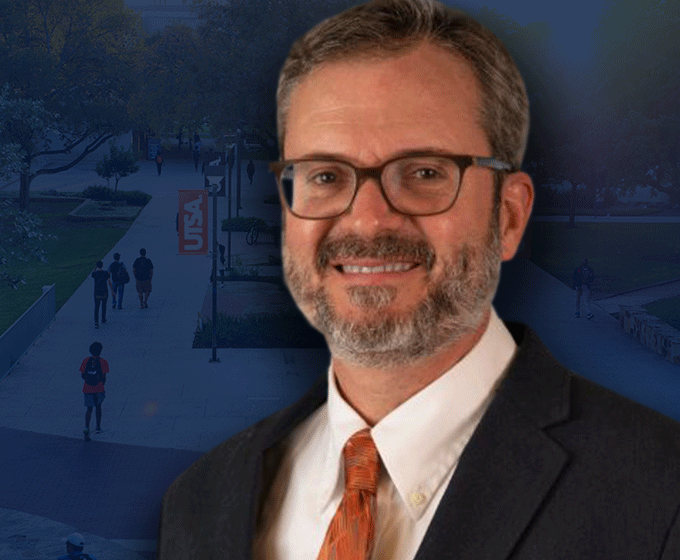
JUNE 21, 2021 — Earning a college degree is one way to achieve social mobility. This is especially true for someone from a lower socioeconomic background looking to raise social status according to the National Center for Education Statistics.
However, there are barriers that can hinder a student’s path to complete a degree.
Recognizing the distinctive barriers that some first-generation students face, Raymond Swisher, professor and chair of the Department of Sociology at UTSA, looked at the link between the college party subculture and its negative impact on graduation rates among first-generation students.
Using data from the National Longitudinal Study of Adolescent to Adult Health that followed thousands of adolesents from across the United States over several years, Swisher examined predictors of substance use among college students and its consequences for subsequent graduation with a four-year degree. The study revealed that a student’s socioeconomic background can protect against the consequences of substance use.
“One concerning aspect of college life and a potential challenge is the prevalence of substance use among college students,” Swisher stated. “Substance abuse has hindered graduation rates and led many universities to reconsider the impact that the party subculture has on student wellbeing.”
Recent qualitative research suggests that substance use may be particularly detrimental for first-generation students. As the first in their family to earn a college degree, the path to graduation is often made more difficult by circumstances such as working long hours and living with parents, as well as an unfamiliar college environment.
Swisher’s research showed that continuing-generation students (those whose parents also have college degrees) are more likely to engage in substance use—most notably binge drinking and marijuana use—than first-generation students.
Such behavior, however, was more likely to negatively impact the graduation rates of first-generation students, who face additonal stressors unlike their peers. For more advantaged continuing-generation students, the party subculture had less of an effect on their graduation prospects.
“Engaging in the campus party subculture is potentially risky for all youth,” Swisher said. “At the same time, it likely reflects a desire for a sense of belonging among one’s peers.”
To address this issue, Swisher suggests that universities should not ignore this desire for social integration, and consider alternative ways to provide students opportunities to make connections with each other that do not carry the risks of substance use.
UTSA Today is produced by University Communications and Marketing, the official news source of The University of Texas at San Antonio. Send your feedback to news@utsa.edu. Keep up-to-date on UTSA news by visiting UTSA Today. Connect with UTSA online at Facebook, Twitter, Youtube and Instagram.
Move In To COLFA is strongly recommended for new students in COLFA. It gives you the chance to learn about the Student Success Center, campus resources and meet new friends!
Academic Classroom: Lecture Hall (MH 2.01.10,) McKinney Humanities BldgWe invite you to join us for Birds Up! Downtown, an exciting welcome back event designed to connect students with the different departments at the Downtown Campus. Students will have the opportunity to learn about some of the departments on campus, gain access to different resources, and collect some giveaways!
Bill Miller PlazaJoin us for an intimate evening of cocktails, conversation, and culinary inspiration with Pati Jinich, Emmy-nominated chef and James Beard Award-winning author. Enjoy light bites and signature drinks in the warm, modern setting of Mezquite as Pati connects with guests over her passion for Mexican cuisine and storytelling.
Mezquite Restaurant in Pullman Market, 221 Newell Ave., San Antonio 78215From inspired courses to thoughtful pairings and a rich sense of community, the Ven a Comer Signature Dinner is a night of shared meals, shared stories, and unforgettable flavor.
Stable Hall (Pear Brewery), 307 Pearl Pkwy, San Antonio 78215Come and celebrate this year's homecoming at the Downtown Campus with food, games, giveaways, music, and more. We look forward to seeing your Roadrunner Spirit!
Bill Miller PlazaThe University of Texas at San Antonio is dedicated to the advancement of knowledge through research and discovery, teaching and learning, community engagement and public service. As an institution of access and excellence, UTSA embraces multicultural traditions and serves as a center for intellectual and creative resources as well as a catalyst for socioeconomic development and the commercialization of intellectual property - for Texas, the nation and the world.
To be a premier public research university, providing access to educational excellence and preparing citizen leaders for the global environment.
We encourage an environment of dialogue and discovery, where integrity, excellence, respect, collaboration and innovation are fostered.